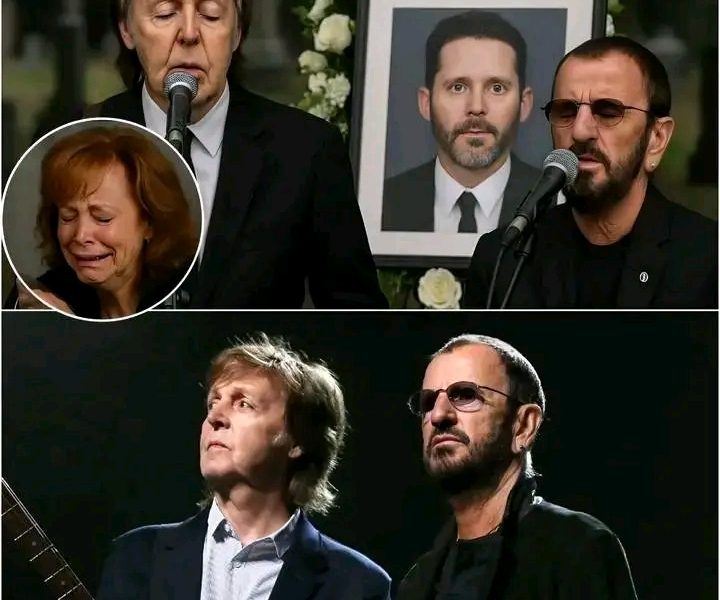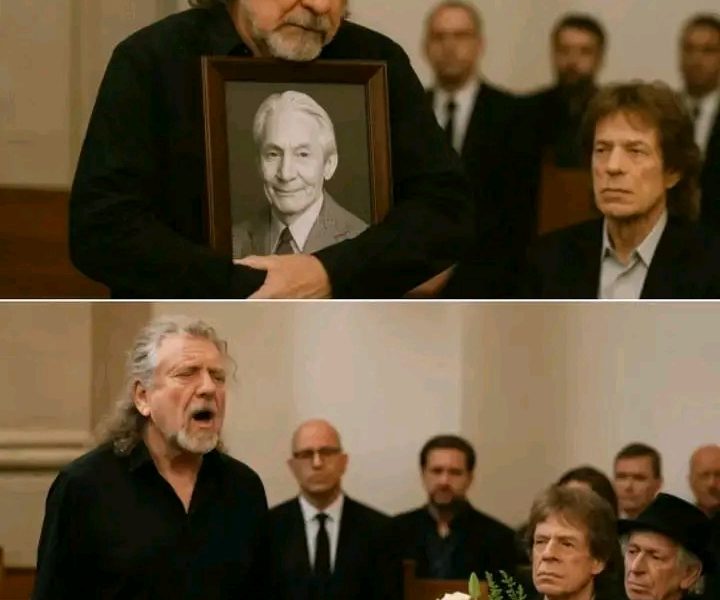—
***“Becoming the Golden God”***
The wind rustled through the tall grass of the West Midlands as seventeen-year-old Robert Plant trudged along a dusty country road, his worn boots kicking up little clouds of earth. The year was 1965, and while the world was swaying to the Merseybeat, something deeper, something guttural and wailing, was stirring in Plant’s chest. The blues were in him—raw, unrefined, and begging to be let loose.
Robert didn’t look the part of a rock star yet. His golden mane had yet to reach its full mythic length, and the clothes—while unconventional—still carried the air of a Midlands lad dreaming beyond his means. But his voice—oh, his voice—was already something otherworldly. He could channel the anguish of Howlin’ Wolf, the fervor of Muddy Waters, and the howl of the Mississippi Delta, all before breakfast.
In smoke-filled clubs, down narrow alleys of Birmingham, Robert made a name for himself, playing with any blues band that would take him. At one such gig, he met a thunderous young drummer named John Bonham. Bonham didn’t play the drums—he attacked them, like a Viking storming ashore, all fury and finesse. They clicked instantly, bonding over a love of American blues and their shared hunger to rise beyond the humdrum of factory-town life.
The two formed **Band of Joy**, a name Robert said came to him in a dream—or maybe a haze of cheap beer. They practiced in barns, church halls, wherever they could find space, and they played like they were born for more. But gigs were sparse, and money was tighter than a snare drum. Robert worked on construction sites by day and screamed into microphones by night.
Then, as if summoned by the gods of rock themselves, fate came calling.
Jimmy Page, the prodigious guitarist who had once been the backbone of The Yardbirds, found himself at a crossroads. His band had dissolved, and he was desperate to form something new—something heavier, something celestial and primal all at once. He had a sound in his head: thunder meeting lightning, blues colliding with the psychedelic.
Page had tried out several singers, none quite right. His ears wanted fire and silk, something that could both seduce and scorch. One evening, a worn demo tape landed on his desk—Band of Joy. Jimmy pressed play.
The voice that burst through the speakers wasn’t just singing—it was summoning. Page leaned back, eyes wide. He knew. He had found the sound.
Robert was skeptical when he first got the call. “Jimmy Page wants *me*?” he said, nearly dropping the phone in his tiny flat.
A week later, Robert stood inside Jimmy’s boathouse in Pangbourne, auditioning. The two jammed to old blues standards, their chemistry instant and electric. Plant’s voice soared and growled in equal measure, while Page’s guitar sang and moaned with otherworldly power.
But Page was cautious. He’d seen talent crumble under pressure before. He brought Robert along to a session with session drummer Chris Dreja, but something was missing.
“Do you know anyone who can really *play*?” Page asked.
Robert didn’t hesitate. “John Bonham.”
Bonham was reluctant. He’d heard tales of Page’s intensity. But Plant convinced him.
The first time the four men—Jimmy Page, Robert Plant, John Bonham, and bassist John Paul Jones—played together, it was like the cosmos aligned. They ran through a cover of “Train Kept A-Rollin’,” and the walls of the room shook. No one spoke when they finished. They just looked at each other, knowing something titanic had been born.
They toured Scandinavia under the name **The New Yardbirds**, fulfilling a contractual obligation. But by the time they returned to England in the fall of 1968, they had become something else entirely—something mythical.
Led Zeppelin.
—
### Chapter Two: *Ascension*
Their debut album, **Led Zeppelin I**, was recorded in a mere 36 hours. Robert’s voice wailed on “Dazed and Confused,” seduced on “Babe I’m Gonna Leave You,” and shattered the heavens on “Communication Breakdown.” It was a revelation, a blueprint for hard rock. The critics scoffed—“noisy,” they said, “derivative.” The fans? They bought in droves.
By 1970, Robert Plant was becoming more than a frontman. He was becoming a god. With each performance, his shirt unbuttoned to his navel, curls spilling like golden fire, he embodied the raw, untamable spirit of rock. He didn’t just sing—he cast spells. Women screamed, men tried to imitate, and the band played on.
Their music grew more ambitious. “Whole Lotta Love” turned into a sonic odyssey, “Stairway to Heaven” a cathedral of rock and mysticism. Plant’s lyrics moved from blues clichés to Tolkien-esque imagery, drawing from Celtic myths, Norse legends, and the English countryside of his youth. He was a poet, a preacher, a prophet.
But fame was a double-edged sword.
The tours grew grueling. The hotels more lavish. The temptations darker.
In 1975, Robert was vacationing in Rhodes, Greece, with his family when their car skidded on a cliffside road. The crash shattered his ankle, leaving him bedridden for months. During recovery, he and Page began working on lyrics for **Presence**, their seventh album. The songs bore the stamp of a man who had danced close to death—especially “Achilles Last Stand,” a ten-minute epic of pain and perseverance.
Plant returned to the stage with a cane and a limp, but no less fire. Still, tragedy was looming.
In 1977, Robert’s five-year-old son Karac fell ill suddenly and died of a viral infection while Plant was on tour in the U.S. The news broke him. He withdrew from the world, contemplating leaving music forever. He buried himself in grief, isolated in the Welsh countryside.
But in the silence, he wrote.
The 1979 album **In Through the Out Door** was quieter, more introspective. “All My Love” was Robert’s tribute to his lost son—aching, beautiful, haunted.
And then came the final blow.
In 1980, John Bonham died after a night of heavy drinking. The thunder was silenced. The band couldn’t go on. There would be no replacements.
Led Zeppelin was no more.
—
### Chapter Three: *Rebirth*
The years that followed were uncertain. Robert launched a solo career, carving out a new sound—less bombastic, more experimental. He embraced North African rhythms, synthesized textures, and collaborated with unexpected partners.
Critics initially scoffed, expecting bombast, not subtlety. But Plant persisted. Albums like *Pictures at Eleven* and *Now and Zen* found their footing. He was no longer the golden god of the 1970s—he was a shamanic traveler, exploring new musical territories.
In the 1990s, he teamed up with Jimmy Page again for the *Page and Plant* project, reimagining Zeppelin classics with Moroccan musicians and orchestras. Yet Robert remained wary of a full Zeppelin reunion. “It was a moment in time,” he often said, “and you can’t recapture the wind.”
Still, they reunited for one legendary night in 2007, at the O2 Arena in London. Plant, now in his late 50s, stood before a crowd of twenty thousand. His voice, aged but still potent, rang through the rafters. They played with Jason Bonham, John’s son, on drums—a symbolic circle closing.
The crowd wept. And for a few hours, it was 1969 again.
—
### Epilogue: *The Echo That Never Dies*
Today, Robert Plant lives quietly, often in the West Midlands where it all began. He walks the hills near his home, the same ones he dreamed upon as a boy. Yet when he speaks, there’s always that twinkle in his eye, that coiled power in his voice.
He’s a storyteller now as much as a singer. Onstage, he still howls, still grins, still sends chills down the spines of those lucky enough to hear him live.
Led Zeppelin’s story may be carved in the tablets of rock history, but Robert’s story—his becoming—was never about mythology. It was about a young man from the Midlands who believed in the blues, believed in poetry, and believed in the power of song to shake the heavens.
And so it was.
The golden god became mortal again. But oh, what a fir
e he left in the world.
—
Let me know if you’d like a continuation, edits, or a PDF version!


